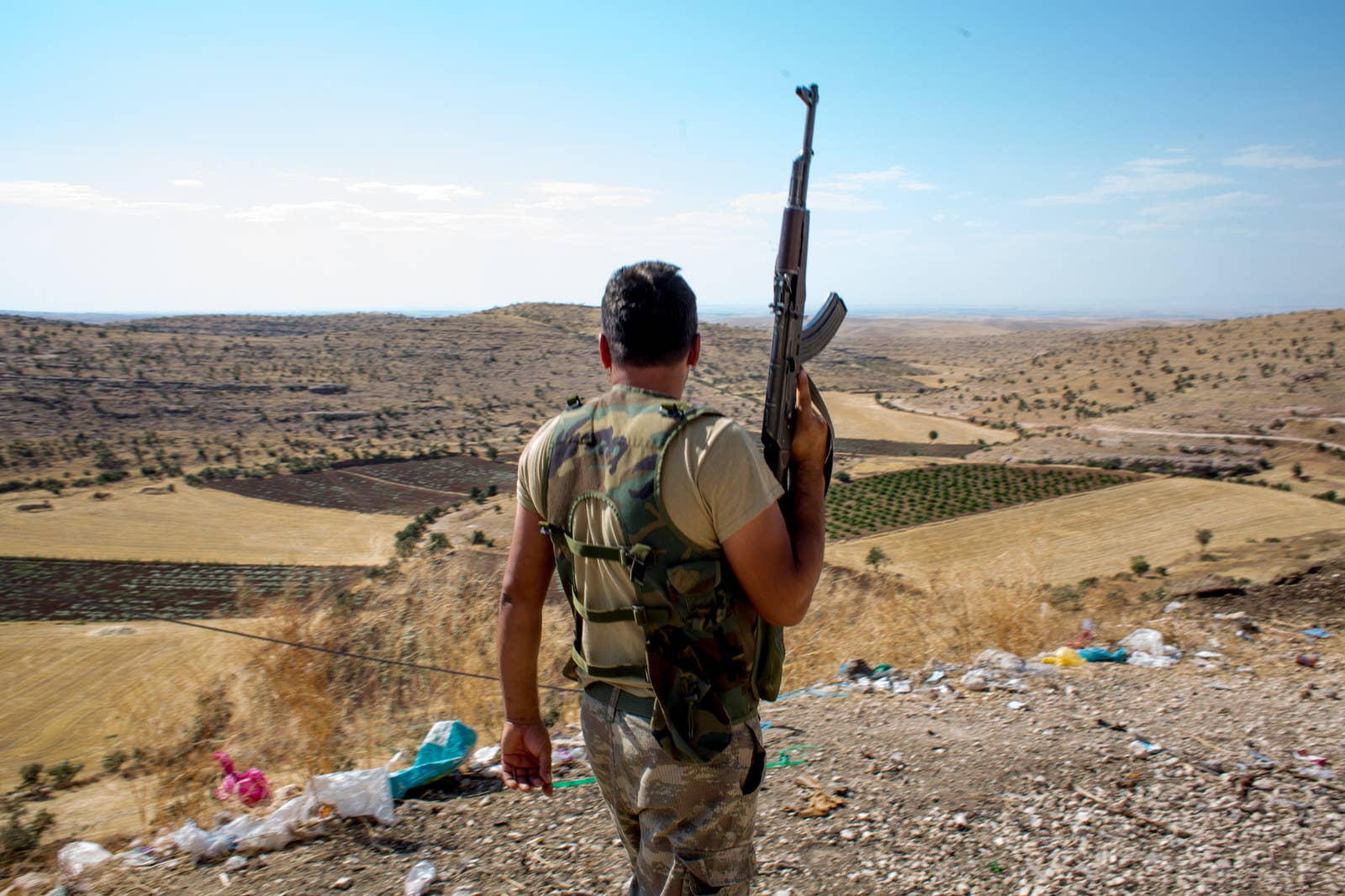
SILVAN, Turkey — Hamesa Benin spent a lifetime fighting and toiling, hoping for some measure of peace and prosperity for his family and the corner of southeast Turkey he calls home. He never found it. Instead he watched as Kurdish villages and towns sank deeper into violence, and his family left divided and broken.
Back in 1994, Hamesa joined a pro-government Kurdish militia known as the Village Guard — or koy korucalar — that the Turkish government had set up to fight against those Kurds who desire independence or autonomy. At that time, many Kurdish villages like his were offered a choice by the authorities: Join the Village Guard, and become an extension of the Turkish state, or face the destruction of your ancestral home.
Turkey’s “Kurdish problem” is often painted in simplistic terms — separatists fighting against the state. But in the southeast, the conflict is far messier, overlaid with tribal, ideological, and regional tensions. Turkey's southeast has become increasingly militarized as young men find their identities in warfare rather than the fading Kurdish culture and language. Some take up arms with the Village Guard, others pledge themselves to ISIS, or to the Kurdistan Workers' Party (PKK) and its various offshoots. In many areas Kurds are pitted against their fellow Kurds.
“He was so hurt when he saw ISIS kill Kurds and insult them ... he felt he had to go to Syria.”
Hamesa, a sullen, gray-eyed man, quietly left the Village Guard almost a decade ago, sick of the guns, violence, and warfare — but especially the feeling it left in him of having betrayed his Kurdish brothers. Even so, his son Salih, who had followed him into the state-backed militia, stayed on, becoming an enthusiastic local leader in their home village of Sifqat. The village sits just outside the town of Silvan — which has witnessed some of the bloodiest recent violence — about an hour’s drive east from the city of Diyarbakir.
The conflict made its way down the generations in the Benin family. Salih’s son, Siar, rebelled against his family and rejected the Village Guard. Instead he drifted, along with much of Turkey’s young, into the orbit of the leftist political groups that dominate Kurdish political life, including the PKK — the main enemy of the Village Guard.
Family meals became treacherous emotional minefields. The strained political fault lines grew and began to crack. “We sat at the same table,” said Hamesa. “We ate together. But we didn’t talk. Even with my son. Even with my grandson. We sat at the same table and didn’t talk.”
And then one day in late 2014, Siar vanished from the family home. Relatives looked for him for days, until word came that he had joined other Kurds fighting for the city of Kobane in Syria, a battle against ISIS that had captured the attention of the world and revived the fortunes of Kurdish separatists throughout the Middle East. Siar had joined the very cause that both his father and grandfather had fought against.
“He told no one he would go,” Hamesa said. “He just disappeared.”
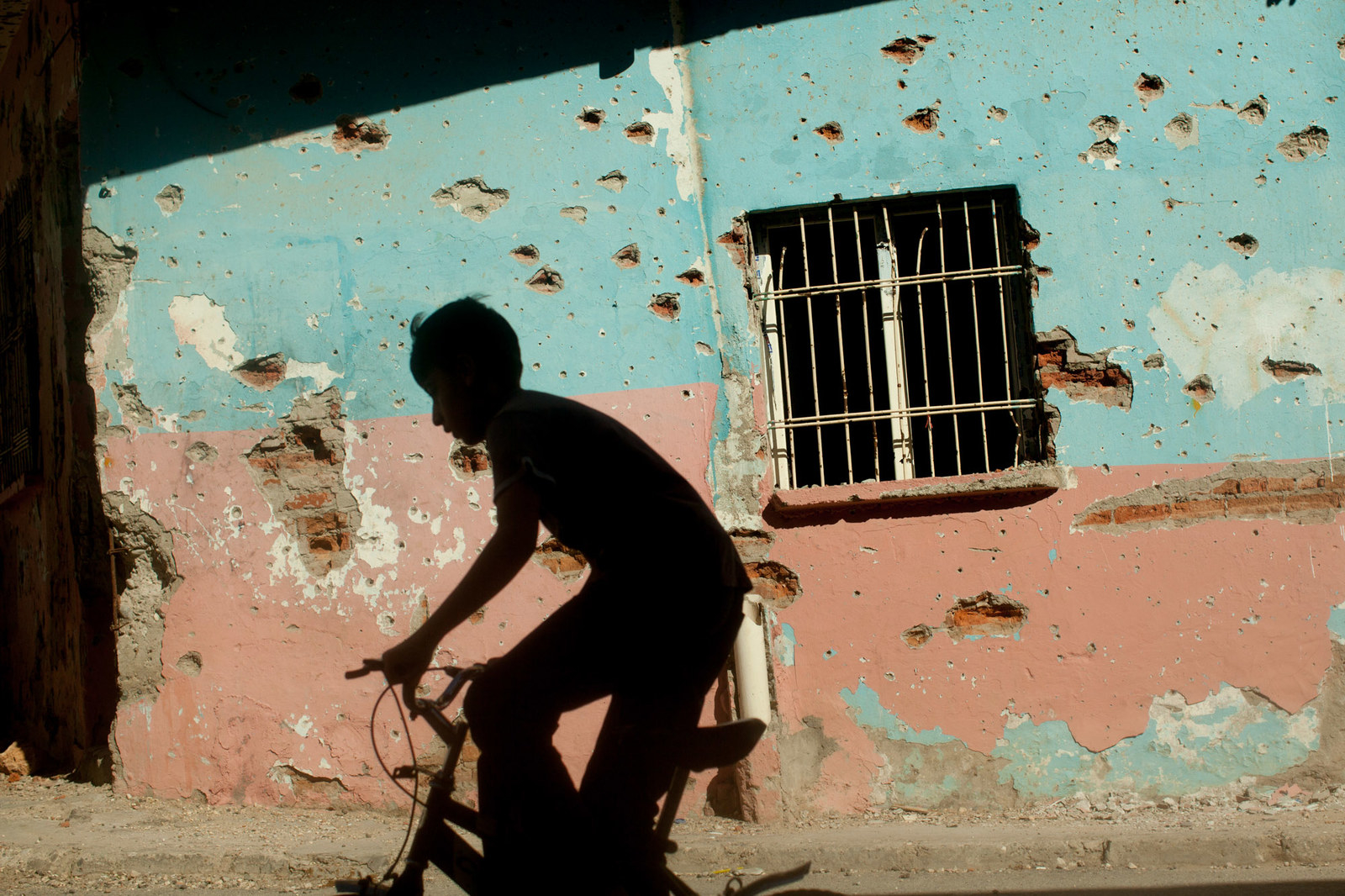
Turkey’s government has been fighting autonomy-minded Kurds since the country was founded out of the ashes of the Ottoman Republic nearly a century ago. It has sought to pacify the restless Kurdish minority using fighter jets, tanks, and ground forces. But it has also tried to induce them into supporting the government by doling out welfare benefits or patronage jobs and granting some cultural rights. But perhaps no tool in the state’s arsenal is more controversial, divisive, and damaging than its decades-long effort to recruit Kurds to the Village Guard to form a shadowy paramilitary force fighting their own people.
To do so, the Turkish state borrowed a strategy from medieval times, when the Ottoman Sultans cultivated Kurdish warlords to protect areas along the borders with the Persian Empire. Turkish authorities began to recruit conservative and tribally inclined Kurds, convincing them that the leftist PKK was against their values and traditions — a classic divide-and-conquer strategy. Local chieftains corralled farmers and villagers into taking up arms to protect their towns from the PKK in what came to be called the Village Guard.
The effect drove fissures through the Kurdish community. “The war really divides families,” said Evren Balta, associate professor at Yildiz Technical University in Istanbul. “Your dad is a Village Guard and you’re pro-PKK. No one trusts either of you. Everyone thinks you are a spy. You bend over backwards to prove who you are. You become more radical.”
“In the 1990s you had some families with one son in the PKK and the other in [Turkish] Hezbollah,” an Islamist militia that has since been outlawed, said Vahap Coskun, a professor of political science at Diyarbakir’s Dicle University. “Now it’s ISIS and the PKK.”
“When I saw him, I just felt hate.”
The knotted conflict in Turkey’s southeast has also complicated US efforts to fight ISIS, creating a confusing jumble of political and military alliances. The Turkish state is fighting the PKK and its offshoots within its own borders as well as in Syria and Iraq. But at the same time, both Turkey and the Kurds are fighting ISIS. And, to complicate matters further, both Turkey and the Kurds are partnered with the US.
The Kurds are the largest ethnic minority in the world without their own state. They pressed for decades under various 20th-century Turkish governments that refused to recognize Kurdish identity, language, and culture. In the late 1970s, a group of university activists led by Abdullah Ocalan launched the PKK, a leftist political party demanding rights for Kurds. A violent and sweeping 1980 military coup and subsequent crackdown prompted the PKK to take up arms in what quickly descended into a full-blown civil war. More than 50,000 lives were lost and hundreds of villages destroyed over the war’s first 15 years.
Turkey's recent history suggests the conflict will only worsen. In November the leaders of the country's Kurdish-led opposition party, the People's Democratic Party (HDP), were arrested, which will likely entice even more young Kurds into the armed insurgency. Deepening cooperation between the US and Kurds fighting ISIS in Syria has further emboldened the leadership of Kurds in their war with Turkey. Meanwhile the government has ramped up its rhetoric against the Kurdish militants, painting them as part of a three-pronged terrorist threat along with ISIS and the Gülenist movement allegedly behind the failed coup attempt earlier this summer. For their part, Kurdish militants are using increasingly bloody tactics — on Saturday they carried out an attack in Istanbul that killed 44 people, including 36 police officers, and wounded more than 160. The militant group Kurdistan Freedom Falcons, or TAK, an offshoot of the PKK, claimed responsibility, in what they said was a revenge attack for violence in the southeast and the ongoing imprisonment of Ocalan.
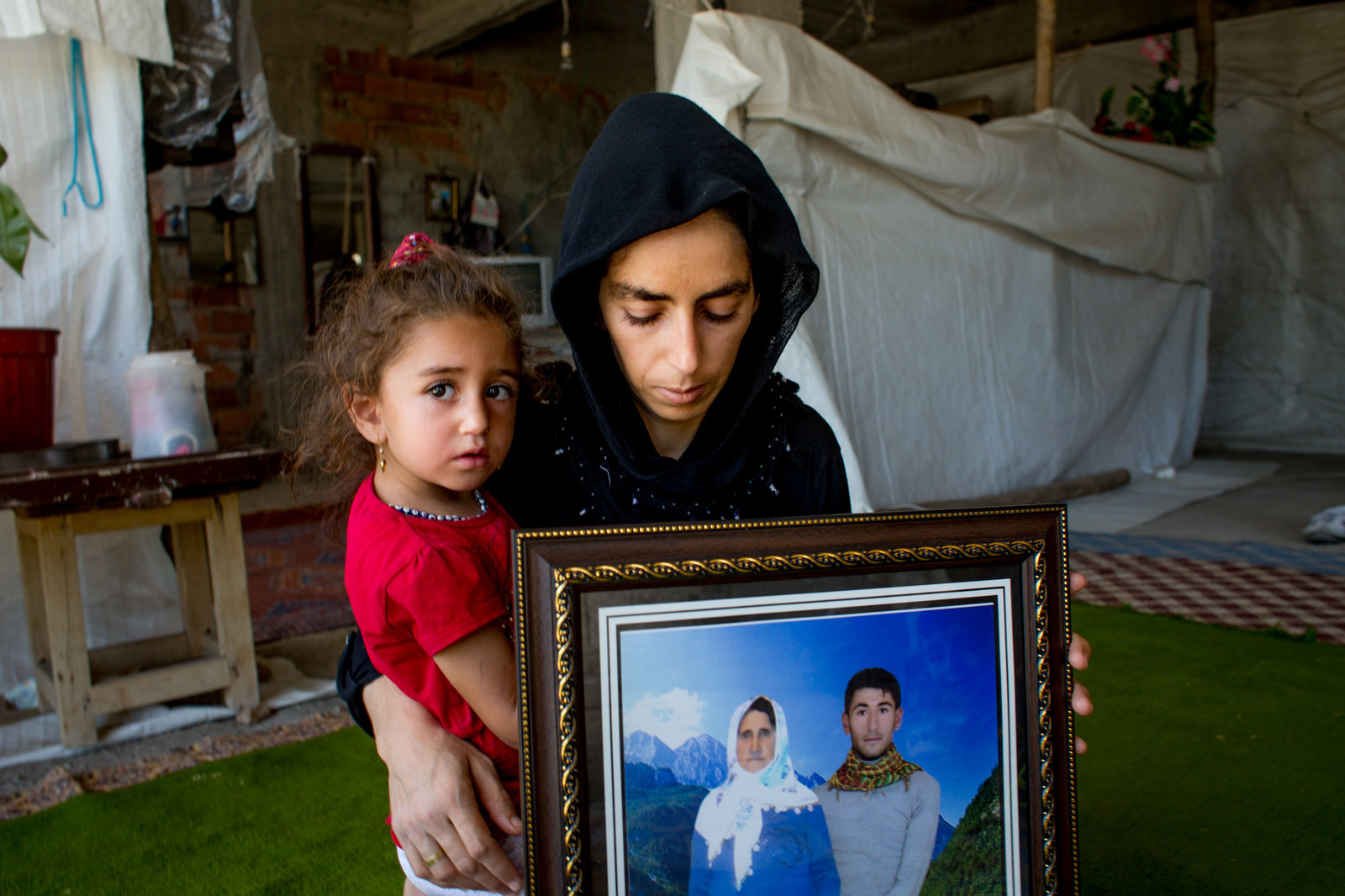
The war with the Kurds has dramatically transformed Kurdish society and Turkish urban culture. Displaced residents of ruined villages or war-ravaged cities fled abroad into exile or for big cities such as Diyarbakir and Istanbul, where their children attended university. Yet more Kurds spent years in prison alongside leftist and Islamist prisoners. But Village Guard leaders like Hamdusena Sinpil, a stout, muscular warlord in the picturesque mountain town of Bosat, consider themselves guardians of fading Kurdish rural identity. If it wasn’t for him, he told BuzzFeed News, his ancient village, with archeological relics dating back to the Roman era, would have fallen prey to the state policy of destroying villages in order to save them from the PKK.
“Here in this village, because of the Village Guard, the economy is good and people are living in peace,” he said. “The population is happy and people are coming and going. Almost 90% of the other villages were destroyed.”
“Your dad is a Village Guard and you’re pro-PKK. No one trusts either of you. Everyone thinks you are a spy.”
Village Guards have also served as an effective information-gathering tool to distinguish between friend and foe of the Turkish state, identify hidden smuggling passages, and navigate unfamiliar political, tribal, and geographical terrain. “There’s a major intelligence component,” said Mustafa Sarihan, a human rights attorney and official of the ruling AK Party in Diyarbakir, who has long advocated disbanding the Village Guard as a way to ease tensions within the Kurdish regions of Turkey. “Why do the military and ministry of interior use the Village Guard? Because they are the ones who know the areas really well.”
While some Village Guards have been accused by rights groups of summary executions and forced expulsions of suspected PKK supporters, many say they joined just for salary, rarely willing to fire their weapons at anyone. Some find themselves trapped by the demands of the armed forces who pay their wages. Dozens of Village Guards have been killed in the fighting since the latest round of war in the southeast began more than a year ago.
“When I’m working and carry my gun and see cars on the road and I know many of the people and they know me, I feel ashamed as a Kurd, and I wonder how I am ever going to go back to my people,” said one member of the Village Guard, sitting in a cafe in Silvan. He asked to remain anonymous out of fear of the authorities. “I am scared all the time. Even right now. When I’m working it is dangerous. Here it is dangerous as well. There is no security. When I’m walking down the street someone can shoot me.”
By the 2000s, the Village Guards were professionalized, and given regular benefits. Some began wearing uniforms, with a patch of the Turkish flag sewn into the shoulder, symbolizing what many Kurds consider an unwelcome encroachment of the state. After coming to power 13 years ago, Turkey’s Islamist-rooted government, led by Recep Tayyip Erdogan, initially sought to recognize Kurds’ language and cultural rights and attempted to forge a lasting deal with the PKK. There was even talk of disbanding the Village Guard; one proposal would turn them into a conservation force to protect the region’s forests and nature preserves. But talks came to nothing and collapsed last year as the war again heated up. Instead of disbanding or retrofitting the Village Guard, the Turkish authorities announced their salaries would continue and numbers increase as the state digs in for a potentially long stretch of war.
The Turkish armed forces, national police, and gendarmerie fighting the PKK total about 900,000 personnel. Balta estimates the salaried Village Guards number about 60,000, with another 20,000 or so volunteers who don’t get paid but are allowed to wear its uniforms and bear arms.
By contrast, the best estimates are that PKK fighters across Turkey and the mountains of northern Iraq number at most 10,000. In terms of raw firepower, the battle between the Turkish state and the PKK is a complete mismatch, but suggests the level of popular support the guerrilla group still must retain with Kurds harboring and supporting it. Despite all the forces lined up against the PKK, there is little hope that the conflict will end anytime soon.
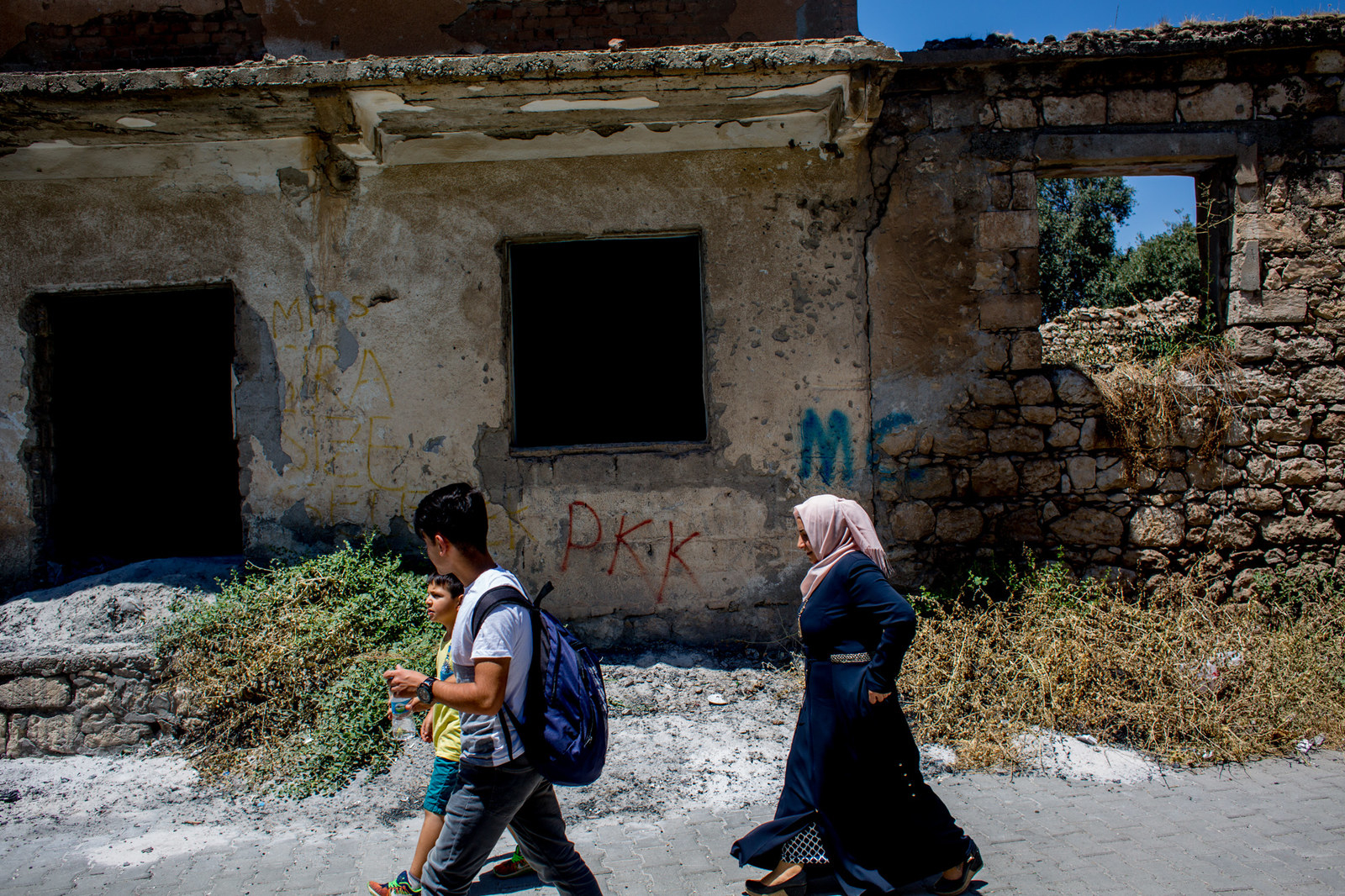
Many who join the Village Guard regret it, even with its financial benefits. Mehmet Akin, a Guard in the tiny village of Derteryar — known as Üçerli in Turkish — described how his father had forced him to give up relatively lucrative construction work in the nearby city of Mardin to become a Village Guard. “My father said he had this AK-47 for 17 years and it was an honor that he didn’t want to give up,” said the 35-year-old. “I didn’t want to disrespect my father.”
But Akin said he would never pass the gun down to his own son, Idris, now 12 years old. He wants him to go to school, perhaps become an engineer. “Our parents have passed this mess on to us,” he said, during a visit to his mountain village. “When I joined there was a peace process going on. Now there’s no peace. When I go to another village, I feel ashamed. We are traitors to the Kurds.”
Hamesa Benin too had urged his son Salih to quit the Village Guard, which he increasingly saw as driving divisions within the broader Kurdish community and his own family. Though two generations of his family had joined the Village Guard, the family had other plans for his grandson, Siar. Siar’s fiancee was studying at a university in eastern Turkey, and they had hopes he too would pursue a career away from the fighting.
Within Hamesa’s family the arguments escalated. He almost cut off relations with his son, Salih, when he refused to quit the Village Guard, but couldn’t bring himself to do it. “I don’t like what he does. He brings the job between us,” he said. “But it’s a family. If you cut off a finger it’s also your hand that’s hurt.”
According to his family, Siar had been brooding for weeks about what was happening in Kobane. The town, adjacent to the Turkish border, is a Kurdish enclave under the control of the People’s Democratic Party, or PYD, and its militia, the Popular Protection Units, or YPG. Both are offshoots of the PKK. Kobane had by July 2014 come under attack by ISIS forces, its residents fleeing for their lives over the Turkish border. Every day TV news reports were full of images of bedraggled, anguished Kurdish women and children clutching blankets and a few possessions as they sought refuge in Turkey.
“He was so hurt when he saw ISIS kill Kurds and insult them,” said a cousin. “His psychology was damaged and he felt he had to go to Syria.”
After Siar crossed the Turkish border to fight in Kobane, the family sought desperately to track him down and convince him to return. Siar’s disappearance may have complicated things politically for his father, Salih. He had spent a lifetime solidifying his family’s reputation as a tough, stalwart supporter of the Turkish state. Having a son join a PKK offshoot was at best an embarrassment for a pro-government militia leader. At worst it was a sign of possible treachery.
Turkish authorities know that Kurdish families often have divided loyalties. Some towns controlled by the Village Guard continue to vote for far-left Kurdish parties in national and local elections. Turkish officials worry that among the ranks of the Village Guard are PKK sympathizers passing along intelligence to the enemy.
Salih, who declined to speak to BuzzFeed News, assured relatives that it was not worry for his own reputation, but love for his child that compelled him to seek Siar's return, according to his father Hamesa and other relatives.
“When he went in, the father was so upset,” said Hamesa. “He was so worried about him. Salih was so scared. He wasn’t ashamed.”
Meanwhile the war between the PKK and Turkish troops in Silvan was raging, with Turkish troops, Village Guards, and young PKK fighters pitted against each other, turning stretches of the city into pockmarked war zones.
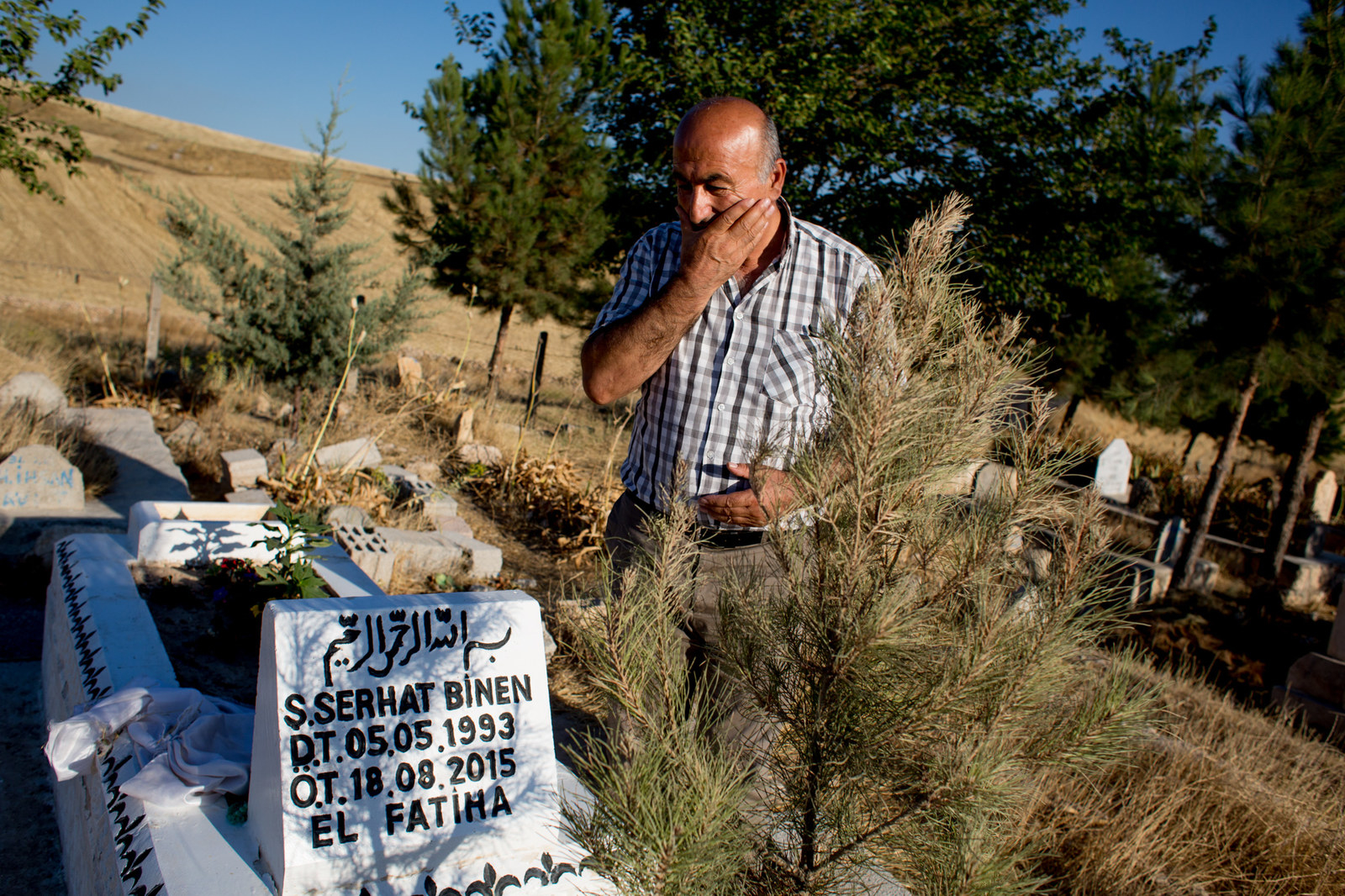
The violence cuts deeply within families. One of Hamesa’s relatives, Vedat Binen, lost his own son in the fighting in Silvan. Just like Siar, the young man had joined the PKK despite his father’s entreaties, and was killed at the age of 22 during the fierce battles for central Silvan in August 2015. As scores of relatives gathered for the funeral, Salih, still worried about his son’s fate, showed up.
Salih and Vedat may have been related but they were political enemies. Salih was an enthusiastic member of the pro-government militia, while Vedat was a guerrilla sympathizer who had spent years in prison for his affiliation with the PKK. They had barely spoken to each other beyond pleasantries at funerals over the years. “When I saw him, I just felt hate,” the 54-year-old Vedat said.
After a few awkward formalities, Salih told his relative about how his son had joined with other Kurds fighting ISIS in Syria. He had a request of his enemy: Could he help get his son home before he too became a victim of the war?
Seeing Salih at the funeral had at first felt like an insult to Vedat. But the request to help save his son — a boy he had known and liked since childhood — had left him confused, pitting his politics against family obligations.
Though he refused to go into Syria, he promised to make some inquiries, to try to locate Siar. With Vedat’s help, Siar’s relatives eventually set up a phone connection, speaking regularly to him in Syria over a spotty line. They pleaded with him to come home.
In February, the young man was persuaded to return to Turkey. But in the months since he had been in Syria, the Turkish government had gone from warily treating the Kurdish fighters in Kobane as US-backed fellow travelers in the war against ISIS to listing them as members of terrorist organizations indistinguishable from the PKK.
Siar’s family promised him he would be treated well if he returned home, and after months of pleading, and following the Kurds’ victory over ISIS in Kobane, the young man acquiesced. But if the family thought their pro-government stance would help him, they were wrong. Incessant PKK attacks in Turkey have only hardened positions against any Kurd in the PKK’s ideological orbit. Siar and a group of other fighters were arrested one day in January shortly after they crossed the border back into Turkey.
Though he had never taken up arms against the Turkish state, Siar was charged with grave terrorism offenses. He was held first in a prison in the Turkish town of Sanliurfa before being moved to one near Antalya. Hamesa, despite his age, made the trip to see his grandson. He recounted the conversation as he slumped into a chair, during a meeting earlier this year at the tailor’s shop.
“Hi, how are you doing, okay?” Siar said to his grandfather.
“Hi, I’m fine. How are you?” Hamesa replied.
“You see our situation here. It’s not good,” Siar told his grandfather. “This is hard. They’re cruel to us. I’m kind in a kind of solitary cell.”
Hamesa is outraged at how his grandson is being treated as he awaits trial. Before he was labeled a pariah by Turkish authorities, Salih Muslim, leader of Syria’s Kurdish political and military organization, was once welcomed repeatedly in Ankara for talks, though Turks have now issued an Interpol warrant for his arrest. Meanwhile, his grandson was jailed for fighting against ISIS.
“He looked weak. He looked weak,” Hamesa said. “Imagine if you are in a solitary cell for a month. How can you not be weak? They don’t let him shave or wash his clothes because he’s a ‘terrorist.’ But how can they call someone who goes to Kobane a terrorist?”
He paused for a moment, as if lost in his thoughts. “Your grandchildren,” he said, “you love them so much, because you see them grow since they are little. You’d do anything for them.”

